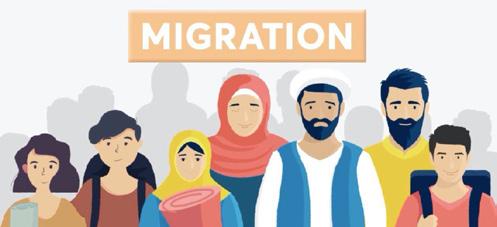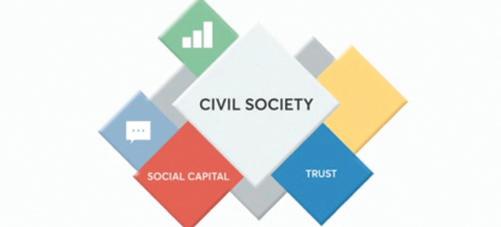
5 minute read
Information and advocacy work
Over the past seven years, CAG has increasingly focused on information and advocacy work. The organization strives to represent and amplify Central Asian grassroots, civil society and marginalized voices towards the Swedish public and decision-makers. In doing so, CAG aims to introduce perspectives that are rarely included at the higher levels of political processes. Information and advocacy work includes, but is not limited to, touring exhibition, role play days, theme days, Central Asia Days, lectures and explainer clips. We strive to establish contacts with universities, decision-makers, and international organizations. CAG’s information and advocacy work includes raising pressing issues related to our thematic areas, which is exemplified by the focus of Central Asia Days and in the content of the exhibition.
Advertisement
For the fourth year in a row, our exhibition on Activism, Civil Society and Rights-based work in Central Asia toured Sweden. The exhibition was first put up in Lund in spring and was well received by the local visitors in the library venue. The other physical version of the exhibition was held in the main venue of Sensus in Malmö. As Covid-19 had some form of impact on most of our activities this year, the exhibition was no exception. An online version of the exhibition was therefore created and aired on Malmö Mediakanal, a local TV channel which reaches 120,000 households around Malmö. The digital exhibition also remains accessible on our Youtube channel.
Role Play Days
Another core aspect of CAG’s advocacy work is to organize Role Play Days. In 2019, CAG introduced an innovation to the approach turning it into a digital roleplaying game; which, in its turn, proved to fit neatly with the changed conditions given the pandemic. The goal behind this roleplaying game is to deepen one’s knowledge about solidarity work and activism through the lens of Central Asia.
The role play was conducted online via Zoom. Besides immersing themselves into the situation of LGBTQ+ people in Kyrgyzstan, participants also learned about other issues in Central Asia. Additionally, four new storylines were created, with the expanded version seeking to familiarise the player with common situations and struggles of matters related to LGBTQ+, climate change and mental health in Central Asia. The role play game will be promoted during different kinds of events and a separate event dedicated to the game is yet to be carried out. You can find the link to play it on CAG’s website and instagram profile in the taplink.




Video clips


Following last year’s video clip on climate change, CAG produced a wide variety of clips on topics such as migration, authoritarianism, civil society, women’s rights, as well as youth and security in Central Asia. The purpose of the clips is to increase knowledge about Central Asia and an opportunity to learn more about current developments and its impact on the region’s countries, such as how migration affects local communities, how the implementation of UN Resolution 2250 is done in Central Asia and how civil society is forming itself in the region.
Central Asia Days 2020

On the 6th and 7th of December, CAG hosted the seventh annual Central Asia Days conference. Following the Covid-19 restrictions, CAG decided to hold Central Asia Days 2020 online. This year’s conference consisted of a series of lectures with activists, civil society representatives and researchers from Central Asia and Europe that work closely with various issues related to Central Asia.
The first day featured three lectures. The first lecture was named Patterns of External and Internal Migration in Central Asia and was led by Aida Alymbaeva, PhD candidate, Max Planck Institute for Social Anthropology, Germany. The lecture was dedicated to the migration trends in Central Asia; which is primarily a provider of labour migrants to Russia, especially those from Uzbekistan, Kyrgyzstan, and Tajikistan as well as the reasons and effects of migration. The second lecture was named Chinese Authoritarian Technologies, held by Niva Yau Tsz Yan, a resident researcher at the OSCE Academy in Bishkek and a fellow at the Foreign Policy Research Institute (FPRI). Niva Yau discussed China’s use and promotion of authoritarian technology in Central Asia, detailing their impacts on daily lives of ordinary citizens and local governments in terms of security and trade. The third lecture Regime Stability and International Relations in an Age of Covid-19 was given by Oleg A. and Edward Lemon, a research assistant professor at the Bush School of Government and Public Service at Texas A&M University and president of the Oxus Society for Central Asian Affairs. They talked about how the pandemic and recent political crisis in Kyrgyzstan are shaping the region’s domestic and international politics, including relations with the region’s two major external powers: Russia and China. The speakers also focused on how Covid-19 has weakened trust in the state and how citizens have responded by stepping in to fulfill roles traditionally taken on by the state, including providing welfare and security.

The second day of the conference consisted of three lectures as well. Aijan Sharshenova, an associate research fellow at the OSCE Academy in Bishkek, presented on the topic of Civil society as a substitute of an under-performing state in the Kyrgyz Republic within the first lecture. The lecture was dedicated to various grassroots volunteer movements in Kyrgyzstan, which often step in to complement or to fill in the gap left by the state in the times of crisis. The second lecture Gendered impacts of climate change in Central Asia was given by Nozilakhon Mukhamedova, a senior researcher in Justus Liebig University, Giessen, Germany. The
Feedback from attendees included: lecture focused on the impacts of climate change on the gendered roles, needs and inequalities in Central Asian societies and gave an outlook for measures and future mainstreaming. The third and the last lecture Climate change and public participation was held by Timur Idrisov, a senior adviser in the national environmental NGO Little Earth in Tajikistan. The presentation included examples of the participation of public organizations in work on climate change at the local, national and regional levels, as well as the main challenges and positive developments that the public environmental movement in Central Asia faces.
I learned about the climate movement and migration in Central Asia. “ I have learnt about climate and environment - something I have not explored in depth before.
I feel I have been very naive about many aspects of life I take for granted – topics like authoritarian technology and the handling of the pandemic in particular. “








